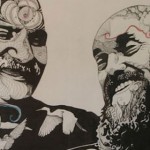by Katie Heaney: For those who can afford it, quitting has become the ultimate form of self-care…
My quitting fantasies became most vivid in December. It was the stretch between Thanksgiving and Christmas, a time when, historically, little work gets accomplished anyway. Here’s how I imagined my resignation: I would wait for that familiar feeling to set in, the one in which I’d sooner be swallowed into the Earth’s core than complete one more routine work task. Then, instead of doing it, I’d simply … not. I would not answer the email. Not send my ideas for the pitch meeting. I’d tell my editor, “You know what, actually? Today’s my last day.” Then I’d sign out of Slack, forever.
But, of course, I never did. The next day would be better, I told myself, and even if it wasn’t, reality proved unignorable: My wife, like millions of other Americans, had lost her job in the pandemic. I was responsible for both our livelihood and our health insurance. I was grateful to have kept my job, one of the few constants in an otherwise turbulent year; at the same time, I couldn’t help but feel I was running out of labor to give, especially as I watched my social-media feeds light up with reports of other professionals clocking out for good. Mayors, academics, journalists, financial analysts, even pastors — all of them, it seemed, were quitting their jobs. Some announced they were leaving for new fields; others had no next steps in mind except to sleep and read and spend time with family. But the reason they gave was the same: They were burned out.
Despite how colloquial the term burnout has become, the concept originated in a strictly clinical setting. Coined in the 1970s by American psychologist Herbert Freudenberger, it referred to the consequences of severe stress and “high ideals” within the “helping professions” like medicine and social work. Among the medical community, however, burnout never quite became a serious issue, perhaps because there was no consensus as to how it should be measured, much less diagnosed. The Maslach Burnout Inventory, developed in 1981, was the most commonly used scale, but even then, it became the subject of considerable infighting among academics. In 2003, the researchers Philip Liu and David Van Liew complained that “the term burnout is used so frequently that it has lost much of its original meaning [and] now seems to have become an alternative word for depression but with a less serious significance.”
Today we use burnout as a catchall term, a word to describe the entire maelstrom of emotion endemic to working life in 2021: anxiety, grief, boredom, exhaustion. One viable cure, it appears, is to quit your job.
Once upon a time, quitting carried negative connotations — weakness of spirit, an un-American lack of discipline. But in recent years, it has become increasingly fashionable to say no. Therapists, career coaches, and influencers alike now push the power of recusing oneself: “No, I won’t take on extra work without added compensation.” “No, I won’t attend the party with people I don’t even like.” “No, I won’t accept a date just to spare someone else’s feelings.” If guarding one’s time became an act of self-empowerment, the ultimate move, then, would be to leave life’s most time-consuming obligation entirely. Today, boldly ditching your job is seen as a radical form of self-care. It’s not only healthy but brave — even aspirational.
Irvin Schonfeld, a former professor of psychology at the City College of New York, sees the proliferated use of burnout as a somewhat misleading way for workers to express dissatisfaction with a particular job. There are, in his view, many good reasons to quit: You’re overworked, you don’t get enough time with family, your boss is terrible, you want a break, or all of the above. None of these necessarily rises to the level of burnout, at least as traditionally defined. “I think it’s enough for someone to say, ‘I became dissatisfied with my job,’ ” says Schonfeld — who, incidentally, retired from teaching partway through the pandemic for what he says were “existential reasons.” “Why do we have to pathologize it?”
There is one good reason: When we pathologize something, it tends to get taken more seriously. Burnout is an attractive diagnosis for the self-aggrandizing; it suggests that one’s job is uniquely draining, almost to the point of a medical emergency. It’s also a predominantly white-collar condition. For those who can afford to quit, claiming burnout may be an effective way to signal one’s essential employability, a way to reassure your future bosses that you will work yourself to the bone for them, too — right after this break. Even those who choose to broadcast their own burnout can’t help but keep hustling. When writing about her own job-related exhaustion in 2017, Arianna Huffington drew a direct line from her sleep-deprived collapse to the authorship of two best-selling books and the founding of a media company, Thrive Global. (Former employees, citing editorial incompetence and mismanagement of resources, don’t quite see it the same way.)
Then again, perhaps the academic notion of burnout was always too narrow. In his 2010 treatise Müdigkeitsgesellschaft (since translated into nearly a dozen languages; the English translation, The Burnout Society, was published in 2015), the Korean-born German philosopher Byung-Chul Han argues that burnout is modern society’s most pervasive affliction, the natural result of “excess positivity,” by which he means capitalism’s unflagging belief in the power of individual productivity. If Zoom and other technologies made many jobs technically possible throughout a year of death and isolation, they also promoted the idea that continuing to work as usual amid unrelenting global suffering was emotionally and spiritually feasible. For many people, it turns out, it wasn’t. As Han explains, “The complaint of the depressive individual, ‘Nothing is possible,’ can only occur in a society that thinks, ‘Nothing is impossible.’ ”
Having transcended the Cold War’s reactive politics and fear of the foreign, Han argues, we’ve become “achievement-subjects” rather than “obedience-subjects.” Ostensibly freed from external dictatorship and bodily threat, we are left to rule ourselves, and we are merciless: “The exhausted, depressive achievement-subject grinds itself down, so to speak … Entirely incapable of stepping outward, of standing outside itself, of relying on the Other, it locks its jaws on itself; paradoxically, this leads the self to hollow and empty out.” Under Han’s theory of contemporary burnout, we are the snake eating its own tail.
Written a decade before the pandemic, Han’s book feels prophetic. “Burnout syndrome occurs when the ego overheats,” he writes, “which follows from too much of the Same.” Does there exist anywhere on earth a better descriptor of the past year?
The Burnout Society offers no tidy solutions; if it did, it would be self-help (and probably a best seller). But it seems obvious that, as alluring as the quitting fantasy may be, the relief it offers is only temporary. The pandemic heightened job stress for pretty much everyone, but the crisis was already well under way. There is no end in sight. As Schonfeld points out, “Unless you’re independently wealthy, you’re probably going to need to return to work at some point, right?”
In my case, nothing has really improved since December. It’s just that, for now, I need my job more than I want to leave it. In the meantime, I can dream. Tomorrow is another day (and another chance to quit).

























































